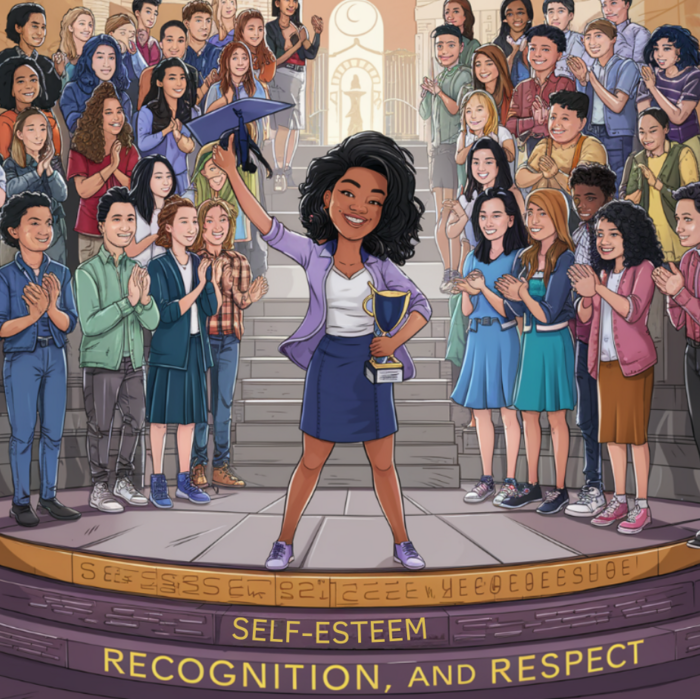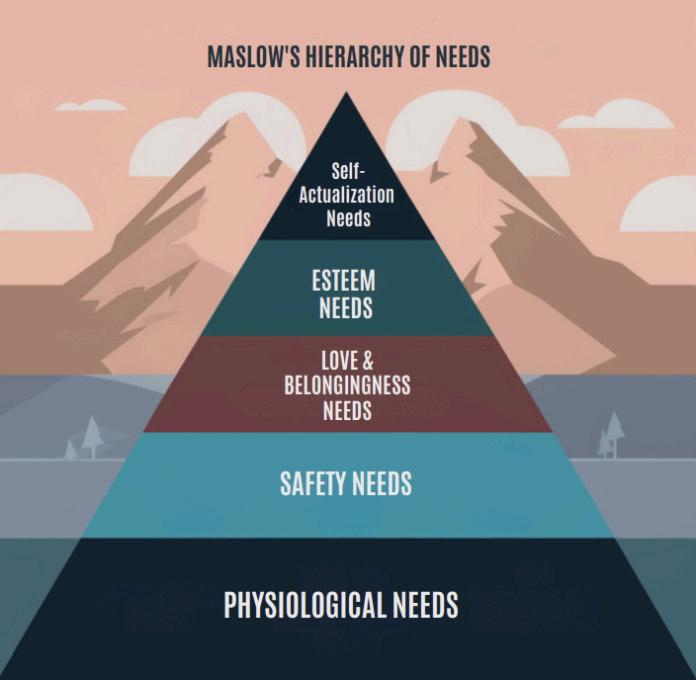Introduction
Maslow’s Hierarchy of Needs is a psychological theory proposed by Abraham Maslow in 1943, which serves as a framework for understanding human motivation. The theory outlines a five-tier model of human needs, often depicted as a pyramid, with basic physiological needs such as food, water, and shelter at the base, followed by safety, love and belonging, esteem, and culminating in self-actualization at the apex. Understanding this hierarchy is crucial as it highlights that individuals are motivated to fulfill basic needs before progressing to higher-level needs. This theory is especially relevant for college students as it underscores the importance of addressing foundational needs to achieve academic success and personal growth. Recognizing these needs can aid students in navigating their educational journey, ensuring they build a solid academic and personal development foundation.
The Five Levels of Maslow’s Hierarchy

Physiological Needs
Physiological needs form the foundation of Maslow’s Hierarchy of Needs, encompassing the essential elements required for human survival, such as food, water, shelter, and sleep. In the context of college students, addressing these basic survival needs is paramount to their overall well-being and academic performance. Without adequate nourishment, students may experience diminished cognitive function and energy levels, negatively impacting their ability to concentrate and learn effectively. Similarly, sufficient sleep is critical for memory consolidation and maintaining mental health. Therefore, ensuring that these fundamental needs are met is the first step towards fostering an environment conducive to academic success.
In a modern-day context, physiological needs extend beyond mere survival to include access to healthy food options, safe housing, and financial stability. College campuses are responsible for providing resources that support students’ nutritional health, such as campus dining services offering balanced meals and programs addressing food insecurity. Safe and accessible housing options on and off-campus are crucial in providing students with a stable living environment. Additionally, through scholarships, grants, and part-time employment opportunities, financial stability can alleviate stress related to meeting basic needs, allowing students to focus on their academic pursuits.
Safety Needs

Safety needs, the second tier of Maslow’s Hierarchy, encompass physical and psychological dimensions. Physical safety pertains to personal security, stable employment, access to resources, and good health. For college students, ensuring physical safety involves minimizing risks and threats on campus and fostering an environment where students feel secure. Employment stability and access to healthcare resources are critical components, providing students with the means to sustain themselves and address health-related concerns.
Psychological safety, however, involves creating an environment free from fear and anxiety, where students feel supported and valued. This can be achieved through robust campus security measures, comprehensive mental health resources, and the promotion of a culture of openness and acceptance. Modern-day safety needs for college students may include mental health counseling, campus safety protocols, and programs that support job market readiness. By addressing these safety needs, colleges can create a secure and supportive atmosphere that promotes student well-being and academic success.
Love and Belongingness Needs
The third level of Maslow’s Hierarchy emphasizes the importance of social relationships and a sense of belonging. For college students, the need for love and belongingness can manifest through friendships, romantic relationships, and family connections. Social interactions and a sense of community are vital for emotional well-being, helping students to feel connected and supported during their educational journey. Participation in campus activities, joining clubs, and forming study groups can enhance these social bonds, fostering a sense of community and belonging.
The need for love and belongingness extends to online communities and social media platforms in today’s digital age. While digital interactions can provide a sense of connection, fostering genuine relationships and inclusivity on campus is essential. Programs that promote diversity and inclusion and initiatives that encourage peer support and mentorship can help students navigate the complexities of social interactions and build meaningful connections. Addressing these social needs is crucial for creating a supportive and inclusive campus environment where students can thrive emotionally and academically.
Esteem Needs

Esteem needs, the fourth level of Maslow’s Hierarchy, pertain to an individual’s need for self-esteem, recognition, and respect from others. Achieving a sense of competence and accomplishment is vital for college students navigating their academic and personal development. Recognition of achievements through academic success, extracurricular involvement, or leadership roles contributes to building self-esteem and a sense of worth. Respect from peers and faculty further reinforces these positive feelings, motivating students to pursue their goals confidently.
In a modern context, esteem needs also encompass the influence of social media and the validation it can provide. While online recognition can boost self-esteem, students need to develop a balanced sense of self-worth that is not solely dependent on external validation. Colleges can support students by providing academic and extracurricular engagement opportunities, recognition programs, and encouraging positive self-reflection. By addressing esteem needs, institutions can help students build a robust self-concept and foster resilience in facing challenges.
Self-Actualization Needs
At the top of Maslow’s hierarchy lies self-actualization, realizing one’s full potential and pursuing personal growth and self-fulfillment. For college students, this involves engaging in activities that align with their passions, cultivating creativity, honing problem-solving skills, and setting and achieving personal and academic goals. Self-actualization is a deeply individual process where students seek to understand and express their true selves while striving to make a meaningful impact in their chosen fields.
In the modern-day context, self-actualization can be facilitated through opportunities for continuous learning, career development, and pursuing personal interests. Colleges can support this journey by offering diverse academic programs, career counseling services, and extracurricular activities that allow students to explore and develop their talents. Encouraging an environment where students can explore their interests and challenge themselves can lead to profound personal growth and a fulfilling educational experience. Pursuing self-actualization sets the stage for students to lead purposeful and impactful lives.
The Field and Its Evolution
Maslow’s Hierarchy of Needs has had a profound historical significance in psychology. Initially met with mixed reactions, the theory was groundbreaking as it shifted focus from pathological aspects of human behavior to a more positive, growth-oriented perspective. It aligned well with the humanistic psychology movement, emphasizing individuals’ potential for self-fulfillment and personal development. Over the decades, Maslow’s theory has influenced psychology and fields like education, business, and healthcare, where understanding human motivation and needs is crucial for fostering productivity and well-being.
Despite its widespread acceptance and application, Maslow’s Hierarchy of Needs has faced criticisms and limitations. One major critique is its perceived lack of empirical support and cultural bias, as the theory was developed based on observations of Western individuals, which might not universally apply. Additionally, some argue that human needs do not always follow a strict hierarchical order and can vary significantly from person to person. Modern interpretations of Maslow’s work have adapted the hierarchy to include considerations for cultural and individual differences, emphasizing a more dynamic and fluid understanding of human needs that accommodates diverse life experiences and societal contexts.
Making the Theory Relevant for Today’s College Students
Addressing contemporary challenges and needs requires a nuanced approach that considers the various pressures today’s students face. Mental health awareness is crucial as college students often experience stress, anxiety, and depression. Institutions can play a pivotal role by providing mental health resources, workshops, and counseling services, promoting a supportive environment where students feel comfortable seeking help. Furthermore, financial pressures have grown significantly and can hinder students’ ability to focus on their studies. Financial literacy programs, scholarships, and part-time job opportunities can alleviate some of these burdens.
Incorporating technology and modern resources is essential to meet the evolving needs of students. Mental wellness apps like Calm and Headspace offer accessible methods for stress management and mindfulness practices. Online learning platforms like Coursera and Khan Academy enable students to supplement their education with courses aligned with their interests and career aspirations. Digital communities and social media groups provide a platform for peer support and networking, fostering a sense of belonging in the virtual space.
Practical tips for students to achieve their needs at each level of Maslow’s Hierarchy include establishing routines, seeking support networks, and setting personal goals. Regular routines can help students manage their time effectively, reducing stress and enhancing productivity. Building and maintaining support networks through campus organizations or online platforms can provide emotional and academic support. Setting personal goals helps students stay motivated and focused, guiding their path toward self-actualization by encouraging them to challenge themselves and pursue their passions.
Conclusion
In summary, Maslow’s Hierarchy of Needs offers a comprehensive framework for understanding the various factors contributing to a student’s well-being and success. From satisfying basic physiological and safety needs to cultivating esteem and reaching self-actualization, recognizing and addressing these needs can significantly enhance the college experience. By integrating this theory into their lives, students can better navigate the challenges of higher education, build resilience, and achieve personal growth. Students must seek balance and fulfillment in all areas, using available resources and support systems to enrich their journey. Ultimately, understanding Maslow’s theory equips students with the insight to pursue a meaningful and purpose-driven academic and personal life.















